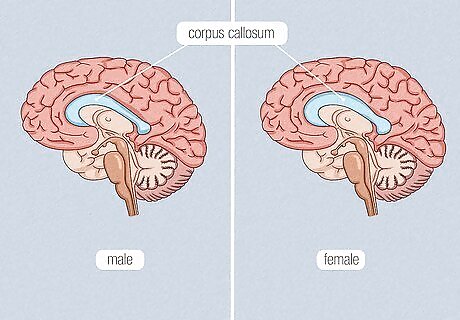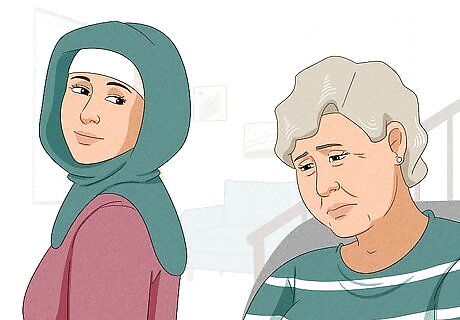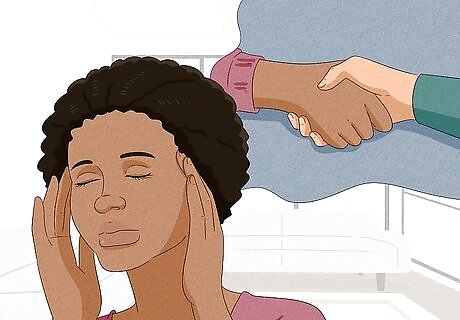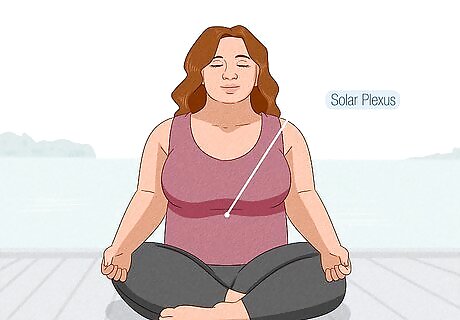
views
- Intuition is the ability to understand something or acquire knowledge immediately, without needing proof or explanation.
- “Women’s intuition” is the belief that women have an instinct for what other people are thinking or feeling, and it’s caused by gendered socialization, biology, or evolution.
- Connect with your intuition by listening to how your body responds to certain situations and questions. If you feel comforted by an answer you say out loud, your intuition is guiding you there.
What is women’s intuition?

Women’s intuition is an instinct for what others are feeling or thinking. “Intuition” is what happens when the brain draws on past experiences and external cues (body language, facial expressions, etc.) to make a decision—this instinct happens so quickly that the reaction is almost unconscious. Scientists aren't sure exactly why women may be more in touch with their intuition, but recent studies have led many to believe that everyone has an intuitive side to them. In the past, women were believed to be better at reading nonverbal cues like facial expressions and body language, however, scientists weren’t sure if this was because of women’s biology or because of how they were raised to behave based on their gender. In pop culture, it was believed that women were more sensitive to emotions and could detect if something was amiss with a person or situation. There wasn’t an exact male equivalent of “female intuition.” Instead, men tend to call their intuition a “gut” instinct or feeling.
Where does women’s intuition come from?

Women were socialized to express better emotional intuition than men. One of the leading theories about where women’s intuition comes from says that both women and men have intuition—men have just been taught to separate their hearts from their heads. For example, in a series of studies that measured the ability of men and women to intuitively predict what others were thinking or feeling, the women’s scores were similar to the men’s. However, when the scientists reminded women that they "should" be better at reading emotions because of the women’s intuition stereotype, the women outperformed the men. Another group of researchers repeated this study but told men that they could earn money by getting the highest intuition scores. As a result, they found that money motivated men as strongly as the women's intuition stereotype motivated women. The idea that women are less intelligent than men because they are more emotional is relatively outdated—female qualities like intuition are more likely just human qualities.

Women had to develop their intuition to survive in a patriarchal society. Some scientists and psychologists have theorized that because women have historically had lower social power, they’ve spent more time observing those in power to become more attuned to their nonverbal cues. As a result, women have had to develop a higher level of emotional awareness and sensitivity to survive in a male-dominated society. An older theory believed that women evolved to be more empathetic and intuitive than men to better protect their offspring from threats and decode the needs of their potential mates. However, a more recent study suggests that the difference in empathy between men and women is not genetic, but is more likely based on socialization or prenatal hormones.

Women’s brains were naturally optimized for intuitive decision-making. Women’s corpus callosum, the part that connects the right and left sides of the brain, is thicker than men’s, which may give women a better ability to integrate their emotions and intuition with the more logical side of their brain when making decisions. However, scientists are still not sure if these structural differences are a result of a difference in brain function or if they are different in brain function because they’re structurally different. The results of a 2013 study also suggest that male brains might be more optimized for motor skills while female brains may be more optimized for analytical and intuitive thinking.
Signs Your Intuition is Speaking to You

You experience a sudden moment of clarity. When you’re actively listening to your intuition, you could find moments of clarity that alert you to what your heart wants. Your intuition can tell you when you’re heading down the wrong path, and show you where to go next.

You easily notice the energy of others. If you have intuition, you might be highly sensitive to the emotions and energy of the other people around you. You may sense immediately when someone else is feeling bad, or know that something is happening without needing any evidence. You might also be an empath, which means you physically feel other people’s feelings, health, and concerns.

You have vivid dreams. Your dreams can often tell your conscious mind what your unconscious mind picks up on. If you have great intuition, you might have dreams that come true or remember your dreams often.

You feel positive in difficult situations. If you’re ever in the middle of a crazy situation, stressed to the limit, and you feel a sense of calm washing over you, it may be your intuition telling you that everything is going to be okay.

Your mind keeps drifting back to a specific thought. Whether you know things you shouldn’t know, or you can’t stop thinking about a choice you could make, your intuition often draws you to a specific thought you can’t shake.

Your hearing increases or you feel an itch in your throat. If your attention is drawn to your hearing or your speech, it may mean your intuition is trying to tell you that your throat chakra needs to be healed. The throat chakra is responsible for how we communicate with others—if it’s blocked, you may have difficulty expressing yourself to others. To open and unblock your throat chakra, practice healing yoga poses or meditate.

The universe is giving you signs. If you’re intuitive but aren’t in touch with your intuition, you may see what your body is trying to tell you materialized as “signs from the universe.” Listen to what those signs may be telling you, and attempt to strengthen your connection to your intuition by grounding yourself to your body.

You feel physically ill. If you have a chronic illness that isn’t cured with medicine, it may be a sign that you’re ignoring your intuition. Sometimes, when you ignore what your body needs, it could lead to blockages that manifest in physical illness. If you feel ill, it could be a sign to listen to your intuition.

You feel a divine presence. Do you receive messages from all around you? If you sense that the world around you or a divine spirit is trying to communicate with you, it could be your intuition trying to speak to you instead.

You’re experiencing deja-vu. Psychic messages seem to drop into your mind all the time, and the strangest thing is they always seem to come true. Does this sound like you? If so, it could be a sign that your intuition is trying to sneak into your conscious mind.
How to Strengthen Your Intuition

Ground yourself and practice listening to your body’s responses. Connect with your body’s wisdom by asking yourself questions and paying attention to your solar plexus—the area of your chest just below your ribcage. Close your eyes and breathe deeply. Start by asking simple yes or no questions out loud, such as “Is my name Josh?” or “Am I wearing the color blue?” Ask a question you know is true, and then ask a question you know is a lie to feel the difference in your chest. After you’re comfortable with knowing how you feel, then move on to ask more in-depth, deep questions about the issues or choices that trouble you, such as “Is it in my highest and best interest to do this?” Pay attention to your dreams—your unconscious mind may say things that your conscious mind doesn’t pick up on. You can also listen to what your gut is telling you to develop your intuition. If you feel butterflies or queasy feelings in your stomach, it may be because your gut’s neurotransmitters are trying to tell you something important.

Separate your fear from your intuition. When you feel tense or panicky, your body is attempting to push you away from a potentially dangerous situation. However, your intuition will pull you towards whatever’s in your best interest and may make you feel excitement, anticipation, or contentment. Gut feelings tend to cause your body to relax because your subconscious knows that you are making the best choice for you. Intuition can be like a mentor—it’s more grounded and wise than fear. Fear can often push you to hide or compromise yourself, but intuition can do the opposite.

Take an intuitive walk. If you’re trying to make a decision and have a hard time stilling your mind, taking a walk can help call your intuition to you. Go outside without distractions, and open your mind, allowing whatever answer you need to come to you. You can also journal for intuitive clarity. Write what you generally want your life to look like for a few minutes each day so you can have a clear vision of the future and move in the direction that makes sense for you.




















Comments
0 comment